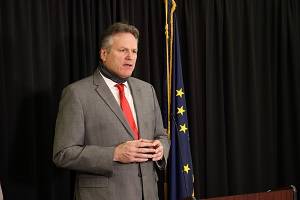Confident in Alaska’s ability to rebound, Gov. Mike Dunleavy said he’s eager to get through the pandemic and back to solving the state’s problems. In an interview with the Empire Wednesday, Dunleavy said the state had done relatively well throughout the coronavirus pandemic, and just that morning Alaska had become the leading state in terms of citizens vaccinated per capita.
“Alaska is the first in the nation in terms of per capita vaccination of its citizens,” Dunleavy said in a phone interview. “Alaska continues to navigate through this virus better than the vast majority of states.”
According to the New York Times, 1.5% of Alaska residents have received two doses of the vaccine, ahead of West Virginia at 1.4% and New Mexico at 1.2%.
2020 had been a difficult year but the state had weathered it well, Dunleavy said.
“We’ve done a pretty good job avoiding a lot of the chaos that consumed the Lower 48 this spring and summer and fall with regards to riots and vandalism,” he said.
[New revenue or no service, lawmakers weigh options]
The governor said he was eager to get Alaska’s economy started again, and his proposal for $300-350 million in general obligation bonds for shovel-ready infrastructure projects is a way to “kill two birds with one stone” by repairing critical infrastructure and putting Alaskans to work. The projects will ultimately be selected by the Legislature and the bonds must be approved by the voters, but Dunleavy said he’s reasonably confident Alaskans will approve the bonds.
The state has cut back payments to local municipalities for school bond debt reimbursement in the past few years, the Alaska Municipal League noted in a letter regarding the Governor’s proposed budget and said if the state were to take on more debt it must also recognize its prior debts. But interest rates were low, Dunleavy said, and the unique nature of a global pandemic necessitated such a move.
“In a once-in-a-100-year pandemic episode, this would be the time,” Dunleavy said of taking on the additional debt.
Alaska was constitutionally obligated to develop its resources, he said, and he sees the resource industry as a way to build an economy that will encourage young people to stay. Oil prices plummeted during the pandemic, but Dunleavy said he is confident petroleum would remain a desirable resource for fuel or plastics for some time to come.
In response to large investment firms like Goldman Sachs moving away from fossil fuels, Dunleavy said there were still groups looking to invest in oil.
Also part of the governor’s recovery plan is a double draw on the Earnings Reserve Account of the Permanent Fund totaling more than $6 billion, part of which would be used to issue an early $5,000 Permanent Fund Dividend. But some lawmakers have been critical of such a large draw, saying it would create future revenue problems for the state.
[Dunleavy proposes budget for ‘unprecedented’ times]
But the Permanent Fund grew by $11 billion in 2020, and the state should use at least some of that money to help struggling Alaskans, Dunleavy said.
“It would irresponsible not to invest in our economy and our workers,” Dunleavy said. “This is not a normal year, this is an anomaly by far.”
The size of the PFD has been a divisive issue in Alaska politics in recent years, and the governor hopes to resolve that tension with three constitutional amendments he said will put the state on a more stable fiscal path.
Those amendments — a government spending cap, a vote of the people for all new taxes and an established formula for the PFD — would also have to be approved by voters.
“We have a system by which we have to work together to move this state ahead,” Dunleavy said. “We have a lot of problems, and we have a lot of opportunities.”
• Contact reporter Peter Segall at psegall@juneauempire.com. Follow him on Twitter at @SegallJnuEmpire.

